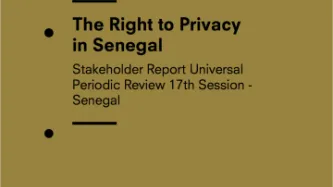Search
Content type: News & Analysis
After two years of pressing the Government to come clean on what, if anything, they are doing to investigate the potentially illegal export of the spyware FinFisher, a ruling today by the Administrative Court in Privacy International’s favour marks a significant turning point in our long-running campaign to bring more transparency and accountability to the surveillance industry.
The High Court slammed Her Majesty’s Revenue and Customs for not disclosing whether it was investigating…
Content type: Press release
After challenging HMRC's blanket refusal to release information about the potentially unlawful export of Gamma International's FinFisher surveillance technology, the court has said that the case should proceed to trial and the grounds of Privacy International's challenge are of public importance.
Privacy International in February filed for judicial review of a decision of HMRC, the body responsible for enforcing export regulations, claiming the department is acting unlawfully in its refusal to…
Content type: News & Analysis
New technologies may hold great benefits for the developing world, but without strong legal frameworks ensuring that rights are adequately protected, they pose serious threats to populations they are supposed to empower.
This is never more evident than with the rapid and widespread implementation of biometric technology. Whilst concerns and challenges are seen in both developed and developing countries when it comes to biometrics, for the latter they are more acute due the absence of laws or…
Content type: Press release
The United Nations General Assembly should approve a new resolution and make clear that indiscriminate surveillance is never consistent with the right to privacy, five human rights organizations said in a November 21, 2013 letter to members of the United Nations General Assembly.
After heated negotiations, the draft resolution on digital privacy initiated by Brazil and Germany emerged on November 21 relatively undamaged, despite efforts by the …
Content type: Press release
Privacy International welcomes the resolution introduced on Friday by Germany and Brazil to the UN General Assembly, affirming the international human right to privacy and its essential nature to the realization of other rights, and condemning mass State surveillance of individuals around the world.
Should the resolution be adopted, it will be the first major statement by a UN body on privacy in 25 years, since General Comment 16 in 1988 by the Human Rights Committee. It is also the first…
Content type: News & Analysis
The argument that human rights are a Western concept and that privacy is not a concern for the developing world was rejected last week in a two-day civil society seminar held in Dakar, Senegal.
More than 30 members of West African civil society participated in the seminar on privacy and data protection, organised by Jonction with the support of the Senegalese Commission for Data Protection. Participants denounced the shortcomings of governments and the private sector in…
Content type: News & Analysis
Privacy International this week submitted stakeholder reports to the United Nations Human Rights Council1 about the human rights records of China, Senegal and Mexico. The reports, prepared in preparation with our partners in the respective countries, analyse the extent to which the right to privacy is respected and protected, and detail instances of privacy violations.
The stakeholder reports will inform the questions asked by members of the Human Rights Council when China, Senegal and…
Content type: Press release
A complaint filed with the Organisation for Economic Cooperation and Development (OECD) against Gamma International, a UK-based company accused of selling surveillance spyware for governments, will proceed and has been accepted for consideration, the UK National Contact Point (NCP) for the OECD announced.
The decision by the NCP is instrumental in the ongoing campaign to hold surveillance companies accountable for their products and the potential enabling of governments to commit human rights…
Content type: Advocacy
This stakeholder is a submission by Privacy International (PI) and Jonction Senegal. PI is a human rights organisation that works to advance and promote the right to privacy and fight surveillance around the world. Jonction Senegal is a human rights organisation based in Dakar, which aims to promote sustainable and equitable development and human rights both in Africa in general and in Senegal in particular. Together PI and Jonction Senegal wish to bring concerns about the protection and…
Content type: Press release
Privacy International, the European Center for Constitutional and Human Rights, the Bahrain Center for Human Rights, Bahrain Watch and Reporters without Borders filed formal complaints with the Organisation for Economic Cooperation and Development (OECD) in the UK and Germany against two surveillance companies on Friday 1st February. The British and German National Contact Points are being asked to investigate Gamma International and Trovicor respectively with regards to both companies’…
Content type: News & Analysis
Bloomberg reported today that security researchers have identified FinFisher spyware - "one of the world’s best-known and elusive cyber weapons" - in malicious emails sent to Bahraini pro-democracy activists, including a naturalized U.S. citizen who owns gas stations in Alabama, a London-based human rights activist and a British-born economist in Bahrain.
Analysis of the emails by CitizenLab (a project based within the University of Toronto Munk School of Global Affairs) revealed that…
Content type: Press release
The Council of the European Union today reinforced restrictive measures on EU exports to Iran, banning "exports of equipment and software intended for use in the monitoring or interception of internet and telephone communications by the Iranian authorities".
The Council also added 17 people responsible for grave human rights violations to the list of those subject to a travel ban and asset freeze. An existing ban on equipment for use in internal repression was transferred from the sanctions…
Content type: News & Analysis
Last week the German Federal Constitutional Court overturned a law on the retention of telecommunications data for law enforcement purposes, stating that it posed a "grave intrusion" to personal privacy and must be revised. In their ruling the judges found that the law stands in contradiction to the basic right of private correspondence and does not protect the principle of proportionality, as it fails to balance the need to provide security with the right to privacy. All data on telephone…






